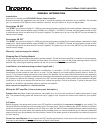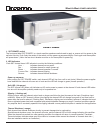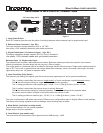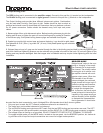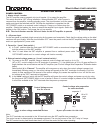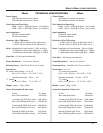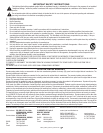
3Bsst & 4Bsst POWER AMPLIFIERS
2
FRONT PANEL
1. 'SST POWER' switch
The front panel label 'SST POWER', is a touch sensitive membrane switch used to apply or remove a/c line power to the
soft start circuitry. Push firmly the center of the switch until the power-up sequence begins. Push again and the amplifier
will power-down. ( Note: the rear circuit breaker must be on for the amplifier to power-up)
2. LED Indicators
Each SST channel has a LED indicator to monitor the following conditions:
Unlit - indicates channel has no power.
Red - indicates channel is muted (power-up)
GReen - indicates channel operation is normal.
FlashinG Red - indicates channel clipping.
ORanGe - indicates channel thermal shutdown.
Power up sequence
After pushing the 'SST POWER' switch, each channel LED will turn from unlit to red (mute). When the power supplies
have stabilized the channel will come out of mute and the LED will change to green (normal operation).
Unlit LED ( No power )
The SST channel LED when unlit indicates no A/C mains power is present at the channel. If both channel LED indica-
tors are unlit the amplifier probably needs only to be powered on.
Clipping ( flashing red )
Clipping occurs when the channel output level no longer can follow the level increase at the input (Overdriven input
condition). When an SST channel is driven into clipping the channel LED will change from green to red then back to
green when the level is reduced ( Flashing Red ). Momentary clipping can be tolerated, however it indicates that maxi-
mum un-distorted power has been surpassed and potential speaker damage may result if overload conditions persist.
Any amplifier that is constantly operated into clipping indicates a more powerful amplifier is needed for that application.
Thermal Shutdown ( orange )
Each channel has thermal shutdown circuitry to prevent damage due to overheating.
Should thermal shutdown occur, the channel will mute, and the channel LED will turn orange indicating this condition.
When the channel has cooled to a safe operating condition the channel will return to normal operation. Persistent
Thermal shutdown indicates steps need to be taken to increase airflow across the channel or channels heat sink. (
Also see installation section on ventilation ).
2
2
1




